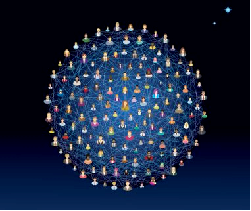November 2017 Research, Science and Knowledge
Read the articles selected in November 2017
Communication from the Commission to the European Parliament, the Council, the European Economic and Social Committe and the Committee of the Regions
Source: https://ec.europa.eu
Education and culture build a more united, stronger and democratic Europe, in a context of profound social change induced by technological development and globalisation, providing the groundwork of social cohesion and mobility, as well the basis of an equitable and active citizenship.
EUA welcomes Commission initiative putting education at the heart of a more social Europe
Source: http://www.eua.be
In its endorsement of the Commission initiative, Eua calls on for closer cooperation between European universities removing administrative and legal obstacles and providing adequate funding to support collaboration on issues such as innovative teaching, curricula development and the recognition of qualifications.
OECD PISA assessment of collaborative problem solving
Source: http://www.oecd.org
Across Oecd countries problem-solving in 15-year-old students turns out to be better performed by girls than by boys, with no significant difference related to the social background. Students with stronger reading or math skills do better in reasoning and interpreting information.
Read more:
World-class universities and the global common good
by Simon Marginson
Source: http://www.universityworldnews.com

The underrepresentation of the common goods associated with universities explains their under-financing. Higher education builds sociability, and a public sphere that is a source of constructive criticism and expert information for governments fosters global mobility, integral to knowledge systems.
Read more:
http://www.universityworldnews.com/article.php?story=20171116115549552
World University Rankings: boosting both competition and collaboration
by Phil Baty
Source: https://www.timeshighereducation.com, 13 November

For all their limitations and faults, THE World University Rankings foster a healthy competition that improves standards of quality worldwide. On the other side, rankings help institutions to identify partners with which to collaborate and to build global networks.
See attached
The end of time sheets? EU pilots “trust-based” grant funding
by David Matthews
Source: Times Higher Education, 12 November

The European Commission has announced a simplification of the Horizon 2020 grant process starting from next year. Researchers will be given a lump sum and won’t have to document every expense. This change in financial scrutiny could have cascade effects on other research funders.
Read more:
https://www.timeshighereducation.com/opinion/end-time-sheets-eu-pilots-trust-based-grant-funding
From Vision to Action: what EUA proposes for the Next Framework for Research and Innovation (FP9)
Fonte: http://www.eua.be/
This document calls on to widen participation in the programme across Europe through sufficient funding to match Europe’s scientific capacity. A multidisciplinary approach is needed to address many societal challenges, and Open Science is the base of a fair and advanced knowledge society.
Educating for the fourth industrial revolution
by Roger Chao Jr
Source: http://www.universityworldnews.com/, 10 November
Technology has changed the way we live and also learn. On the other side, changing work, the industry and social life needs require new learning methods, flexible and based on outcomes-units, which are still a challenge for the current educational systems.
Read more:
http://www.universityworldnews.com/article.php?story=20171107123728676
In turbulent times trust is crucial for universities
by Wilhelm Krull
Source: http://www.universityworldnews.com, 10 November
Hostile attitudes against evidence-based policy-making and science-based expertise also affect universities. The decline of trust in higher education and research should open labs and classrooms to the society, and make academics globally engaged citizens.
Read more:
http://www.universityworldnews.com/article.php?story=20171107085924596
Better use of skills in the workplace
Source: http://www.oecd.org
Workforce development should be the core of an enterprise action to be sustainable and of higher added value. Public policies are needed to help SMEs in this work required for improving the quality of employment and maximizing the distribution of income and wealth.
Read more:
http://www.oecd-ilibrary.org/employment/better-use-of-skills-in-the-workplace_9789264281394-en
What are the gender differences and the labour market outcomes across the different fields of study?
Source: http://www.oecd.org/
While most graduates are women, STEM is still a male-dominated field of study, despite girls scores in PISA science assessment are similar at age 15. The career decisions are not due to differences in aptitudes, but rather to stereotypes, and are influenced by the gender gap in employment rates in those fields.
See attached
OECD Digital Economy Outlook 2017
Source: http://www.oecd.org
Despite the amazing technological progress, digitalisation benefits are not equally spread across countries and within societies. For a more inclusive and sustainable global economy it’s crucial to equip workers and citizens with appropriate skills to ensure a democratic access to digital networks and services.
Read more:
Globalisation requires us to foster global citizens
by Patrick Blessinger & Enakshi Sengupta
Source: http://www.universityworldnews.com
Education helps to address the refugee crisis around the world. Humanistic training, rooted in democratic principles and universal human rights nurtures global citizens, aware of belonging to a broader, interdependent and interconnected human community.
Read more:
http://www.universityworldnews.com/article.php?story=20171031125338516
Scientists fear that EU could again block stem cell patents
by David Matthews
Source: Times Highe Education, 7 November

Recent advances in research on stem cells could lead European courts to restrict their use after that the EU highest court in 2014 had lifted a ban on patenting them, lacking at that time the “inherent capacity of developing into a human being”.
Read more:
http://www.universityworldnews.com/article.php?story=20171024133538586
EUA response to the European Commission’s Work Programme2018
Source: http://www.eua.be, 17 October
The Eua though acknowledging the importance of education in the European agenda regrets that the Commission’s programme is not focused enough on the development of European Research Area and that high-level skills and competencies are not included in the European Pillar of Social Rights.
See attached
Accès à l’université: la sélection reste taboue
by Caroline Beyer
Source: Le Figaro, 30 October
In France a government project wants to tackle the ticklish question about the selection for the access to tertiary education, with the aim to orientate students in their studies starting from the secondary school, ending with drawing the candidates to universities by lot.
EUA Statement on Open Science to EU Institutions and National Governments
Source: eua.be
Open Science needs new European infrastructures such an Open Science Cloud for dissemination, preservation and reuse of research results, changing the current publishing system and providing adequate legal frameworks, also at national level, that embed OA in all research projects.
Computers and the Future of Skill Demand
by Stuart W. Elliott
Source: http://www.oecd.org/, 27 October
The technological development will transform the competencies required for work and education. This report used the results of Oecd Survey of Adult Skills to understand how computers can reproduce human capabilities and how this will drive skill demand and the whole economy in the next future.
Read more:
L’Académie denonce “le péril mortel” de l’écriture inclusive
by Marie-Estelle Pech
Source: Le Figaro, 27 October
The Académie française, an institution with the function of vigilance and codification of the language transformations, has pronounced negatively about the inclusive writing, just become a subject of school books, because its redundant complexity would infringe the economy of the langue.
Info
- Pubblicato il : 04/12/2017 Modificato il : 04/04/2019

